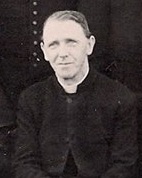
His remains were removed from the Sacred Heart Home, Castlebar, to St Patrick's Church, Newport, where concelebrated Requiem Mass for the repose of his soul was offered. Priests from various parts of the Archdiocese, together with representatives of the educational, political and commercial life of the west attended.
Western People, December 31, 1980
The Late Canon Kileen, Newport An Appeciation.
" Behold, a great priest who in his days pleased God and was found just." Newport has been singularly blessed over the years with many illustrious and gifted pastors, but the late Canon Thomas Killeen who spent forty-five years of priestly service in our area, was unique. As a priest, a scholar, a historian a patriot and a linguist he was a king among men. while remaining at the same time a simple man of the people.
The Canon's priestly ministry took him from Finney to Balla, to Mulrany, to the Aran Islands and finally to Newport where he was P.P. from 1948 until his retirement in 1972. In each of his assignments the same traits of character came to the fore. His unshakeable faith in the Providence of God and in the intercession of Our Lady knew no limits and were answered accordingly — and often disconcertingly. The Mass. the Blessed Sacrament and the Rosary were the three devotions nearest his heart. He fostered them by his example and by his preaching. His daily homilies, which were simple enough for a child to follow were so profound as to give the learned food for thought. "A priest is expendable" was his motto, and nowhere was this more evident than in his administration of the Sacrament of Penance. No hour was inconvenient, no time was limited when any penitent sought his help. His greatest joy was to be of use to others. This led to his practical love for the poor. In the "bad times" many a family discovered his unobtrusive help when the shop bills were paid, a bag of flour delivered to the door, or a Government grant made available when things seemed hopeless.
In the midst of all his prayer and activity the Canon also found time for intellectual pursuits. He was an avid reader. His tastes ranged from books on theology, philosophy, scripture, music, the ancient classics down to the modem novel. As a result, he was well equipped for his historical research of the areas in which he served. His invaluable documentation on the history of Aran is not so well known as the "Little Annals of Burrishoole", which latter he compiled with the assistance of the Mulrany scholar — the late Padraic O'Morain. twenty-five years ago. As recently as last February, the Canon helped members of the local Macra na Tuaithe Club to research and appreciate their local history, and to produce a "daughter'' booklet—"Newport, our own place." Coupled with this love of history, was of course, love of the Irish language, which again was given practical expression. He spoke in Irish, wrote in Irish, thought in Irish, collected Irish prayers. Irish stories and Irish legends. The Irish saints and martyrs were so real to him that he could not but love the country which gave them birth. Apart from his work for the history and language of Ireland, he was proud and fearless in discharge of his duty as confessor to "'the boys" in "the troubled nineteen twenties.
The late Canon will also be remembered as a Church builder. He was responsible for the erection of the Church in Innismaan, the oratory in Shramore, and the oratory of Our I.ady Queen of Martyrs in Newport. The many Marian Shrines which dot the parish were also erected at his inspiration. It was his hope that these buildings and shrines would lead his people closer to God and to Our Lady and form centres for the many lay and missionary movements which he had initiated in the parish.
Perhaps however, the Canon's most endearing quality was his great love for children. He knew each child in the parish by Christian name, and his custom of presenting 5p to each newcomer to school was honoured to the end. He drew the children like a magnet, and they regarded him as one of themselves. During his last illness the children made sure that prayers for his welfare were offered in their homes. He would not have asked for better.
This world is the poorer for his passing. His wit and humour, his understanding and sympathy, his patient endurance of adversity, but above all, his constant and untiring spirit of prayer have shown to all what it means to be "a man of God". Go mba fada buan a chuimhne, agus ar dheis De go raibh a anam glegeal!
A Parishioner.
Mayo News, January 07, 1981